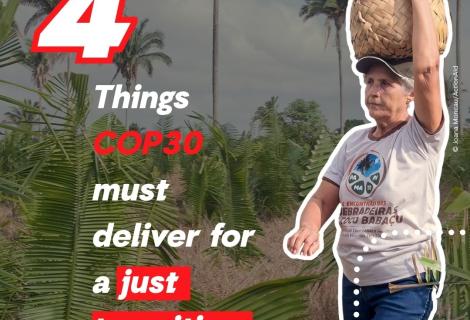ActionAid urges governments to prioritize people, as it prepares to lobby for a just transition mechanism at COP30

At the Belem COP 2025
ActionAid - which supports communities on the frontlines of the climate crisis – is joining with other climate organizations at COP30 to demand governments agree to climate action that prioritizes people and takes a just transition approach.
It says the current approach is systematically ignoring Global South communities, with new research by the charity revealing less than three percent of climate finance is supporting just transition approaches that priorities the needs of workers, women and communities when tackling the climate crisis*.
Teresa Anderson, Global Lead for Climate Justice at ActionAid International, said: “Climate action might be taking place, but the needs of people at the heart of these transitions are being ignored, and communities are being left out of decisions that acutely impact them.
“None of us can hide from the fact that the climate crisis is escalating year on year. What we need to see from governments is a commitment to move away from fossils fuels and industrial agriculture and towards renewables and agroecology but not at the expense of people’s lives and livelihoods. Cutting emissions shouldn’t mean cutting corners.”
ActionAid is calling for COP30 negotiations in Belém, Brazil to agree to coordinate just transition globally. A ‘Belém Action Mechanism’ would ensure a global approach to coordination, shared learning and support for implementation on just transition.
This is essential so that local people can shape plans that might affect them, and get the support, new job opportunities or training they need to ensure climate action benefits them and doesn’t accidentally push them into poverty.
“Without a just transition plan – we don’t have a robust, global approach to the problem and the situation is haphazard and disorganized.” said Anderson.
Alongside this demand, ActionAid is urging wealthy polluting countries to do their fair share and provide trillions of dollars in grant-based climate finance each year to Global South countries.
“Disappointingly, last year’s COP29 in Baku didn’t deliver the climate finance that the world needs to properly tackle the global crisis. We’re another year on and the situation is desperate. Why can’t governments see that the more finance is pushed in the form of loans, the further vulnerable countries are being pushed into debt?” Anderson added.
Things you Need to Know about the Ongoing COP30
The COP30 climate summit is this year being held in Brazil from November 10 – 21, 2025 and it’s centered on the most urgent challenge of translating climate ambition into real-world delivery.
The summit’s core theme is capturing in the notion of a “decade of acceleration and delivery,” with its Action Agenda structured around six pillars which mitigation, adaption, finance, technology, capacity-building and cross cutting equality issues.
From the opening days, several striking issues have surfaced: despite the goals of the Paris Agreement, current commitments leave the planet on a warming path of 2.3-2.5 °C still risking overshooting the 1.5 °C target.
The issues of forest, biodiversity and indigenous rights are still being pushed into the spotlight especially in regions hosting the Amazon, the nature-based solutions agenda is especially visible. Other major emphasis has also been made on adaption finance and resilience which parties and advocates are calling for more support to developing counties facing extreme weather, rising seas, and other impacts of climate change.
And the issues of trade and finance tensions are also emerging at the COP, the India case has been critical to carbon which has been bordered on adjustment mechanism propose by the European Union as protectionist.